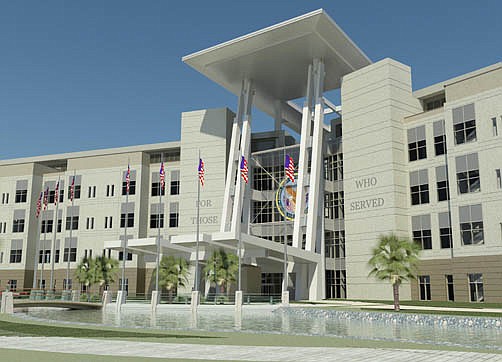- May 3, 2024
-
-
Loading

Loading

Joe Battle saluted the American flag alongside more than 100 veterans at the Mayflower Retirement Community on Friday afternoon, Nov. 12. Then the associate director of the Central Florida VA promised to take care of them.
“I can’t think of a more appropriate name for a speaker on Veterans Day,” Lt. Col. Bob Copeland said in his introduction of the Veterans Day ceremony’s keynote speaker. It had been a battle to get funding for the hospital, Battle said, but the hard part is over.
He gave an amassed cadre of retired veterans a sneak peek at what’s rising out of the ground near south Orlando’s Lake Nona neighborhood — the largest veterans’ hospital in Central Florida, 1.2 million square feet, to be exact.
“This is going to be the nicest hospital you’ve ever seen when we’re done,” Battle said.
The money, $665 million in federal funding, is already in place for construction, which began in earnest in 2009. As of now, it’s still a skeleton. But that steel and concrete megalith sprawling across a flat stretch of land, already dubbed the Medical City by the University of Central Florida, will soon tower over nearby construction projects as the entire area rises in simultaneity.
What the medical center will add to the VA hospital’s repertoire is more than 300 beds stretching across 65 acres of land, including a 120-bed community living center and a 60-bed rehabilitation facility for homeless or drug-addicted veterans.
One hundred percent of those hospital rooms will be single-patient rooms, he said.
“Oh, wow,” echoed a reactionary chorus from the crowd.
And it’ll all be surrounded by a facility that’s engineered to adapt to the future, Battle said. Partnering with UCF’s medical school, the hospital will act as a teaching hospital for aspiring medical students.
For those who’ll someday be doctors, a futuristic approach to surgical training will take the pain and risk out of assigning young doctors to delicate patients. The new hospital’s patients won’t be alive at all — they’ll be simulated, part of a high-tech program that takes the danger out of first-time surgeries.
“In the past, all medical training was real,” Battle said. “Now we have simulators where [students] can do 300-400 gall bladder removals before they ever touch a patient.”
And as the medical field moves ever forward into the future, the hospital is designed to adapt with it, he said.
“We need to change as health care changes,” Battle said. “It reinvents itself every five years.”
By the end of 2012, four years after its official groundbreaking, that cycle will have nearly completed as the hospital’s doors officially open to veterans for the first time. And on the face of the medical center’s entryway, they’ll see a welcoming statement etched in stone — “For those who have served.”
“We want everyone who comes here to feel like they’re being honored,” Battle said.